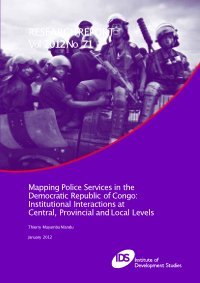Mapping Police Services in the Democratic Republic of Congo: Institutional Interactions at Central, Provincial and Local Levels
By Thierry Mayamba Niandu.
This paper examines the roles, responsibilities and interactions between the various formal and informal institutions and stakeholders involved in the management of police services in the DRC. It identifies informal networks that influence decision-making processes and policy implementation, and provides an analysis of interactions between the Congolese population and national and international actors. It also aims to highlight both horizontal and vertical accountability mechanisms within the existing legal framework, setting out to identify any legal gaps and contradictions, which could explain overlapping mandates. The study provides interesting geographical and administrative data on national security systems, and uses a multidimensional governance approach to understand the complexity of the security sector and the interconnectedness between the relevant actors. The study concludes that stakeholders of the security and police sectors of the DRC are linked together in a web of complex and dynamic systems, characterised by discrepancies between theory and practice. It is inaccurate to think of these systems and mechanisms as working either in opposition to one another or in parallel. In fact, these systems intertwine more than they conflict, and there are significant overlaps and confusion with regard to the mandates of the existing institutions, structures and actors involved. All security services in the DRC possess a legal framework within which they must operate. The legal contradictions and loopholes identified in this paper are often the result of dubious interpretations, or even deliberate misinterpretations of existing operational provisions underlying the functioning of security services. The research concludes that there is very poor coordination between the various actors and institutions involved in the management of security services in the DRC. This creates a dysfunctional structure characterised by a culture of impunity, with only a semblance of autonomy and independence among actors, but never with regard to senior civil servants in charge of coordination.
Brighton, UK: Institute of Development Studies, 2012. 107p.


